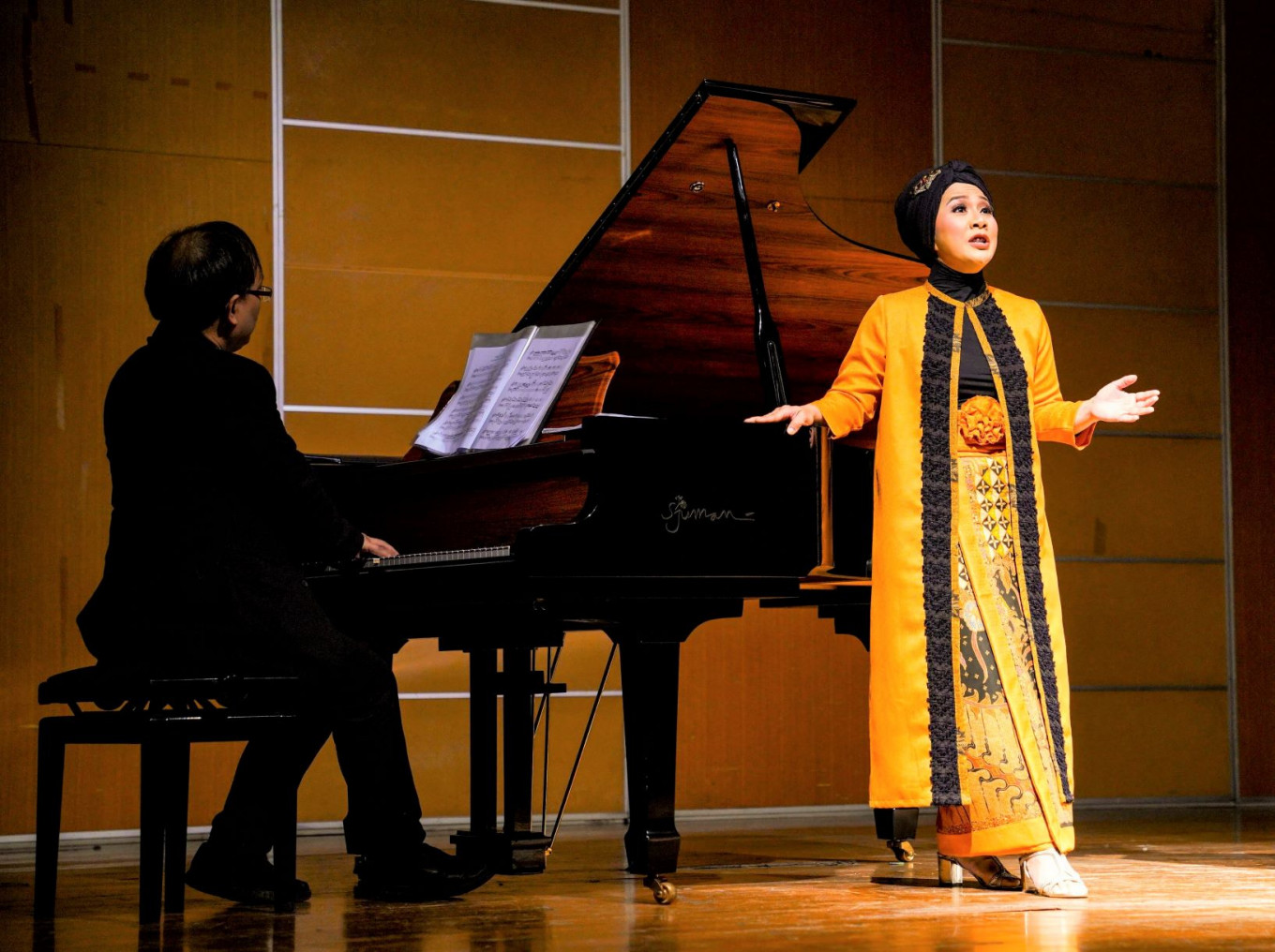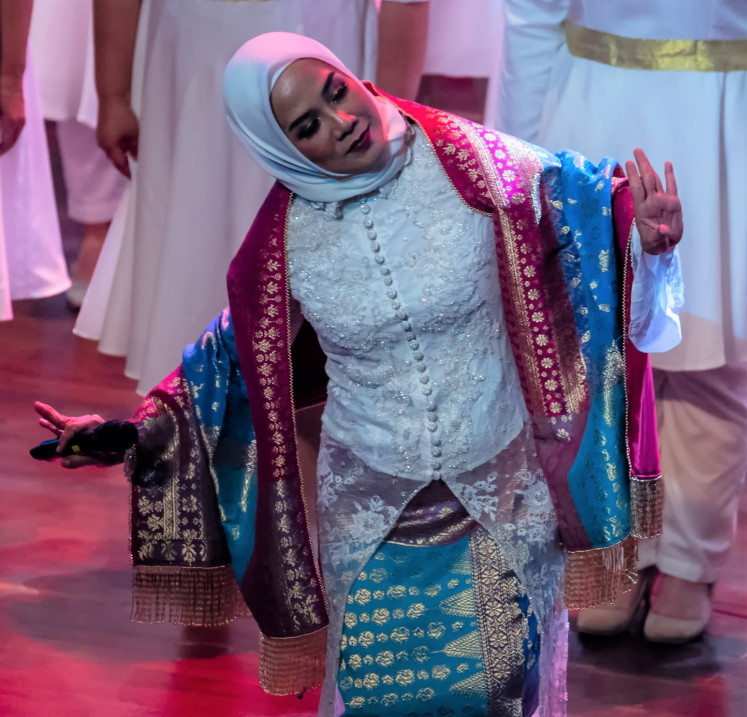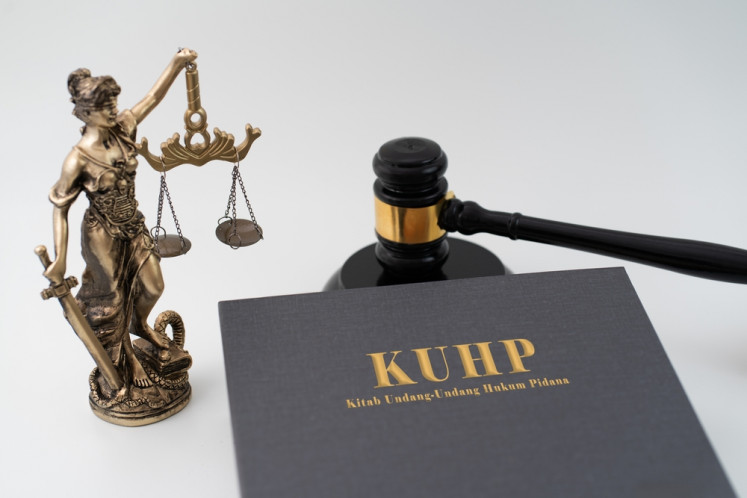Popular Reads
Top Results
Can't find what you're looking for?
View all search resultsPopular Reads
Top Results
Can't find what you're looking for?
View all search resultsAning Katamsi grows her own breed of ‘seriosa’
The renowned operatic soprano stays true to her roots in Goethe’s #MusicTalk series.
Change text size
Gift Premium Articles
to Anyone
W
hen you turn on the radio, chances are that you will find hardly any seriosa songs on the playlist of a typical station. As it happens, pop music have overshadowed the genre decades ago, though some still maintain the art.
The Great Dictionary of the Indonesian Language defines seriosa as a “serious” musical style because of the higher vocal techniques it requires. The term likely derives from “serioso”, a musical direction that means serious or grave. Avid music lovers will know that seriosa music is found primarily in opera and that it colloquially refers to classical music.
Radio Republic Indonesia (RRI) has been credited with raising the popularity of the Indonesian term, which the state-run station uses for a category in its Bintang Radio (Radio Star) singing competition. But the musical style had actually existed in the country before that,
One of the most renowned seriosa vocalists is soprano Ratna Kusumaningrum, better known as Aning Katamsi, who featured on the June 6 edition of the Goethe-Institut Indonesien’s #MusicTalk, a combined performance and discussion series streamed on its Instragram account @goetheinstitut_indonesien.
The first song Aning performed was Mochtar Embut’s “Segala Puji” (All Praises), which was inspired by the Surah Al-Fatihah in the Quran.
“On the music sheet is the word forte,” said Aning, referring to the musical direction for loud or strong. “So when I sang it as intended, I felt the greatness of God.”
The next verse, “maha sempurna suci abadi” (the most perfect, eternally pure) came about, was not marked decrescendo, but she sang it by gradually decreasing her vocal volume anyway.
“Along with the musical rhythm, it’s also about self-humbling, as we are far from perfect or eternally pure,” she said, explaining her interpretation.
Flowing moves: Soprano Aning Katamsi performs with the Paragita student choir of the University of Indonesia during its anniversary concert in August last year at Taman Ismail Marzuki arts center in Central Jakarta. (Courtesy of Sahala Sihombing/-)A protégé of the venerable vocal coach Catharina Leimena, Aning was exposed to professional music at a young age, as she comes from an artistic family.
People were introduced to the Katamsi name through her father Amoroso Katamsi, who famously portrayed Soeharto in the 1984 film Pengkhianatan G30S PKI (Treachery of G30S PKI).
But it is her mother, soprano Pranawengrum Katamsi, who has been the greatest influence on Aning’s vocal career.
Considered by some as the “mother of Indonesian seriosa”, Pranawengrum won numerous accolades in the Bintang Radio competition, particularly from the 1960s to the 1980s.
Years later, Aning would follow her mother’s footsteps to the Bintang Radio to win the competition in 1985. This marked the start of her career in the nation’s seriosa scene.
Aning explained that the way she performed a song was merely her own personal interpretation, and was not a definitive vocal rendition, especially for younger singers.
The next song she discussed during her #MusicTalk session was F.X. Soetopo’s “Puisi Rumah Bambu” (Poem of the Bamboo House), which was based on the work of poet Kirdjomulyo.
Aning said the song was a hymn of sorts to Sanggar Bambu, the studio where Yogyakartan artists used to gather.
Founded in 1959, the Sanggar Bambu community has been instrumental in national arts development, with its membership including Emha Ainun Najib, Ebiet G. Ade and Arifin C. Noer, to name a few.
“When I first interpreted [the song], the phrase ‘pandanglah aku, pandanglah aku’ [look at me, look at me] seemed to be about how a man looks at a woman and vice versa, but at my age now, I understood it to mean a place where we can truly find ourselves,” said the 51-year-old.
Pak Topo, as Aning calls Soetopo, was a close friend of her parents, and she was herself once a member of the choir he led.
“He was a very dramatic character. Even though it is a contemplative [piece], he wears his heart on his sleeve as can be seen in the lyrics,” she said.
“I once heard him playing the piano at his house, and he was very spirited when it came to the forte parts,” Aning recalled.
In interpreting tembang puitik (lyrical poems), Aning said that after studying the technical aspects, the poetry should take center stage.
“Usually, I would read them first, so as to [determine] which points are stressed or at least to get a feel for the rhythm. After that, we delve into the melody, for which we will already have a conception from the poetry. It’s no longer about just singing a melody, but rather singing the poetry,” she said, and that she took this approach to clearly discern the message behind the words.
Aning said that her musical understanding was influenced by her mother’s interpretations, which she called her “roots” in discovering the musical style.
“Of course, after all these years I have come up with my own [stylistic] interpretations, but I think the roots are still from my mother. I then developed them into trees and flowers, so to speak,” she said. (ste)











